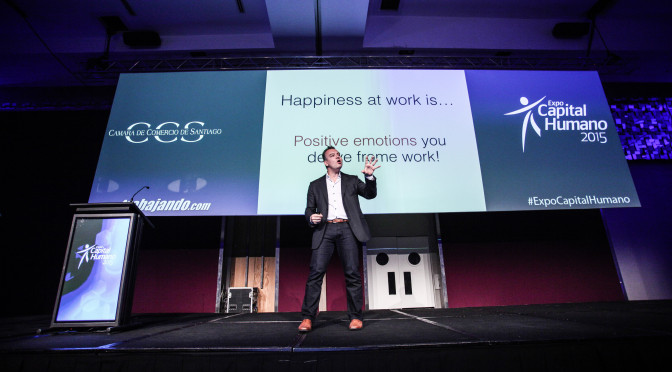Happy workplaces are more profitable and innovative, attract the best employees and have lower absenteeism and employee turnover rates. Simply put, happy companies make more money.
But how do you create a happy workplace? We believe some of the answers are found in positive psychology – a fascinating field and one of the main inspirations for the work we do with our clients around the world.
Traditional psychology looks at everything that can go wrong with our minds – psychosis, neurosis, phobias, depression etc – and asks how it can be treated/cured. It’s an incredibly important field but positive psychology asks the opposite question: When are we happy? What does it take for people to live good lives and thrive psychologically? The field has been especially active for the last 30 years and we are learning some really interesting and surprising things about happiness.
Here are the five findings from positive psychology that we believe are the most relevant in the workplace.
1: Positive emotions have many beneficial effect on us and on our job performance
We tend to trivialize emotions in the workplace. It doesn’t matter what you feel, the prevailing thinking goes – it matters what you think.
You should never show emotions at work and the true professional has no emotions at work. You should be like Spock from Star Trek who once said “Emotions are alien to me. I’m a scientist.”
But this turns out to be impossible. Not only do we have emotions, those emotions affect our physical and mental well-being in many ways and, in general, positive emotions have some strong positive effects on our work performance.
Here’s one example:
… a number of the participants were either shown a comedy movie clip or treated to free chocolate, drinks and fruit. Others were questioned about recent family tragedies, such as bereavements, to assess whether lower levels of happiness were later associated with lower levels of productivity.
… they found happiness made people around 12% more productive.
So far, studies have shown that experiencing positive emotions makes us:
- More productive
- More creative
- Healthier
- Braver
- Less stressed
- More resilient
- More helpful
- Less biased
- More optimistic
- More intrinsically motivated
- Faster learners
- More likeable
- Better team players
- More generous
Simply put, happy people not only feel better and thrive more, they also do better work. This helps explain why happy companies are more profitable and hence why no workplace can afford to ignore how people feel at work.
2: Emotions are contagious
One study in emotional contagion at work brought test subjects together for a simulated negotiation. They didn’t know that one member of the group was an actor extensively trained by the researchers to exhibit certain emotions during the meeting.
Would the emotions of one person affect the rest of the group? The answer is yes – and when the emotions transmitted by the actor were positive, the whole group became more effective:
There was a significant influence of emotional contagion on individual-level attitudes and group processes. As predicted, the positive emotional contagion group members experienced improved cooperation, decreased conflict, and increased perceived task performance.
It turns out that how people around you feel rubs off on you and vice versa. Being around others involves taking on some of their emotions and transferring some of yours to them. We have all experienced this. Being around happy people makes us a little happier. Being around miserable bastards has the opposite effect.
This is highly relevant in the workplace because it shows we don’t exist in isolation. Happiness is a social phenomenon and each of us influence, and are in turn influenced by, the people around us.
3: Small actions can have a large effect on our happiness
One of the coolest things about positive psychology is that it is highly research-based and the various interventions are tested in numerous studies.
You may think that in order to become happier in life, you have to win the lottery or achieve massive amounts of success. But what they have consistently found is that simple interventions are surprisingly effective. Here are some examples of proven happiness interventions:
- Write a gratitude letter to a person who has helped you
- Make a list of 3 good things that happened to you today/this week
- Perform a random act of kindness for someone else
- Receive positive feedback
In the workplace, this means that while organizational factors like strategies, vision, values and processes do matter, it also matters how we work together and interact in our teams on a day-to-day basis. Do managers treat their employees with respect and kindness? Do coworkers trust each other, help each other and maintain good relationships? Do people take the time to treat each other well in the workplace?
However, the research also shows that happiness interventions only work under 2 conditions:
- You have to do it and keep doing it. This is hardly surprising.
- You have to want to do it yourself. If someone else forces you to do it, it doesn’t increase happiness. This is why you have to be careful not to mandate certain behaviors at work in the name of happiness.
4: Unexpected things make us happy
According to research, we become a happier when good things happen to us (duh!) but the effect is even bigger when good things happen to us unexpectedly:
Emory University and Baylor College of Medicine researchers used Magnetic Resonance Imaging brain scans to measure changes in human brain activity in response to a sequence of pleasurable stimuli.
They used a computer-controlled device to squirt fruit juice or water into the mouths of 25 research participants. The patterns of the squirting were either predictable or unpredictable.
The researchers found that the MRI scans showed a brain area called the nucleus accumbens to be much more active when the subjects received unpredictable patterns of juice and water.
So:
- Something nice happens that you expect = good
- Something nice happens unexpectedly = even better
This is interesting in the context of happiness at work because many of the things companies do to make their employees happier are utterly predictable: Summer parties, Christmas parties, Bonuses, team events, and so on happen on an almost completely fixed schedule, which serves to diminish their effectiveness.
This is why we advocate also doing random acts of workplace kindness. According to this research, a small well-meant surprising gesture towards an employee or a team may make them much happier.
So what could you do, to surprise a co-worker today? Here are some examples:
5: Making others happy, makes us happy
It’s been shown consistently that doing things to make yourself happier has a small effect on your happiness but doing things for others, elevates their happiness AND yours much more.
In one study, participants received a small amount of money that they could spend either on themselves or on others. Their happiness was measured before and after, and subjects who spent the money on others experiences a much larger boost to their happiness.
This means that one of the most reliable paths to happiness at work is to focus less on your own happiness and more on making others – be it coworkers or customers – happier.
This is not to say that you should sacrifice yourself for others, to the point where you neglect your own happiness. It just means that focusing only on your own happiness is likely to be a shallow, meaningless and ultimately unsuccessful.
The upshot
Happy employees are healthier and more productive and happy companies make more money.
That’s why every company and every manager need to make happiness at work their most important strategic priority. These findings from positive psychology help point the way on how to do it.
Related posts






